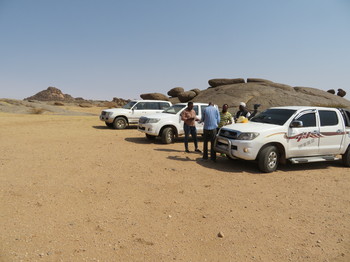Sudan financial analyst denounces ‘doubling of service fees’

Passenger vehicles in northern Sudan (File photo: RD)
According to financial analyst Hafiz Ismail, the current Minister of Finance should be dismissed. A new government is to review his finance policies “that turned into collecting fees and taxes without providing services”. Various fees were increased on Monday.
Ismail told Radio Dabanga on Tuesday that the Ministry of Finance and Economic Planning “is taking advantage of the government vacuum and the absence of a legislative council to impose huge increases in service fees and taxes”.
Jibril Ibrahim, Minister of Finance and leader of the Justice and Equality Movement (JEM) is to be held responsible for the recent increases, he said.
The analyst warned for “the great impact of these decisions on the various segments of society”.and said he wonders where the funds went that became available after the lifting of subsidies and increasing a number of taxes in 2022.
He called for the dismissal of Ibrahim, addressing the political situation, forming a government, and reviewing the finance policies.
The JEM backed the October 2021 coup d’état by which the military took power from a civilian-led government chaired by Abdallah Hamdok. The international community reacted by suspending aid to the new transitional government. By June 2022, Sudan had lost $4,364 billion in international aid.
Increases
On Monday morning, vehicle owners in Sudan were surprised to hear about a more than 150 per cent increase in licensing and inspection fees.
Car owners now have to pay SDG7,000 (about $12*) to SDG14,200 for inspection, while owners of buses, other passenger vehicles, and lorries pay SDG17,700.
The entry fees for Khartoum International Airport doubled to SDG1,000 ($1,75).
Applying for a new passport now costs SDG51,000, about the half of the monthly salary of a basic school teacher.
In October last year, the Finance Minister called for expanding the span of taxes, as he considered it “the most effective and successful way to increase tax revenues and combat tax evasion”.
Many economic experts however said that the measures would further increase the economic hardships of many Sudanese, who already struggle to make ends meet. Economic expert and politician Sidgi Kaballo warned of a ‘revolution of the hungry’ if the root causes of the economic problems would not be addressed.
The government’s new tax policies indeed led to many complaints and strikes in the country. In end October, Sudan’s Chambers of Commerce Federation (CCF) demanded an immediate review of the economic policies and the abolition of the business profits taxes, which were significantly raised as well. The Finance Ministry responded by proposing to amend the income tax on businesses and real estate profits and the personal income tax for 2023.
* The selling rates of the US dollar at Sudanese banks this morning varied between SDG578-584, according to the Central Bank of Sudan.











 and then
and then